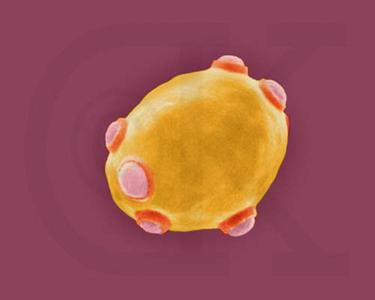
来自密歇根大学研究人员的一项新遗传研究表明,无论你是在烤面包或是构建一个生物体,以正确的顺序按适当量始终如一地添加成分是成功的关键。
利用面包酵母,Patricia Wittkopp和同事们开发了一种新方法阐明了随机遗传突变和自然选择对基因表达进化的影响。他们的研究结果发布在3月16日的《自然》(Nature)杂志上。
密歇根大学生态学和进化生物学系、以及分子、细胞和发育生物学系副教授Wittkopp说:“这些研究结果告诉了我们,自然选择对于一些突变效应的影响在生物体的进化中发挥了极大的作用。我们开发的这种方法使得我们能够测试这些影响是什么,以及更好地了解进化的过程。”
在这项研究中,密歇根大学的研究人员利用了帮助酵母细胞将糖类转化为生长所用能量的TDH3基因。为了了解遗传突变对于TDH3表达的不同影响,他们系统地改变了启动子中的每一个DNA碱基对。
他们在这一基因区域中构建出了所有可能的不同的遗传突变,并检测了每一个突变造成的基因表达改变。
“令人惊讶地是,我们发现大多数的突变没有改变TDH3的平均表达,而是改变了基因完全相同的细胞间TDH3表达差异,”Wittkopp说。
论文的第一作者、研究生Brian Metzger说:“这就像你以不改变面包平均质量的方式改变一块面包的配方,使得个别的面包块的味道不可预知的变好或变坏。”
研究人员随后鉴定了天然酵母菌株,看在自然环境下酵母真正利用了许多遗传“食谱”中的哪一个。
Metzger说:“我们发现控制了TDH3表达、提高了基因表达差异的序列很少存在于自然环境中,表明自然选择更喜欢让TDH3表达保持一致性,使得每个细胞生成相似数量的基因产物。”
实验表明,自然选择不仅可以影响基因表达的水平,还影响了表达的一致性。这种表达噪音(expression noise)的一致性通过改变细胞获得最有利的基因产物量的机会影响了进化适应性。
Wittkopp说:“检测新突变的影响提供了有关进化谜题关键性的缺失的一块。这项研究显示了了解在缺失自然选择的情况下性状发生的改变,可以更深入地认识导致自然环境中观察到的一些遗传差异的进化过程。”
原文链接:Selection on noise constrains variation in a eukaryotic promoter
Genetic variation segregating within a species reflects the combined activities of mutation, selection, and genetic drift. In the absence of selection, polymorphisms are expected to be a random subset of new mutations; thus, comparing the effects of polymorphisms and new mutations provides a test for selection. When evidence of selection exists, such comparisons can identify properties of mutations that are most likely to persist in natural populations. Here we investigate how mutation and selection have shaped variation in a cis-regulatory sequence controlling gene expression by empirically determining the effects of polymorphisms segregating in the TDH3 promoter among 85 strains of Saccharomyces cerevisiae and comparing their effects to a distribution of mutational effects defined by 236 point mutations in the same promoter. Surprisingly, we find that selection on expression noise (that is, variability in expression among genetically identical cells) appears to have had a greater impact on sequence variation in the TDH3 promoter than selection on mean expression level. This is not necessarily because variation in expression noise impacts fitness more than variation in mean expression level, but rather because of differences in the distributions of mutational effects for these two phenotypes. This study shows how systematically examining the effects of new mutations can enrich our understanding of evolutionary mechanisms. It also provides rare empirical evidence of selection acting on expression noise.

